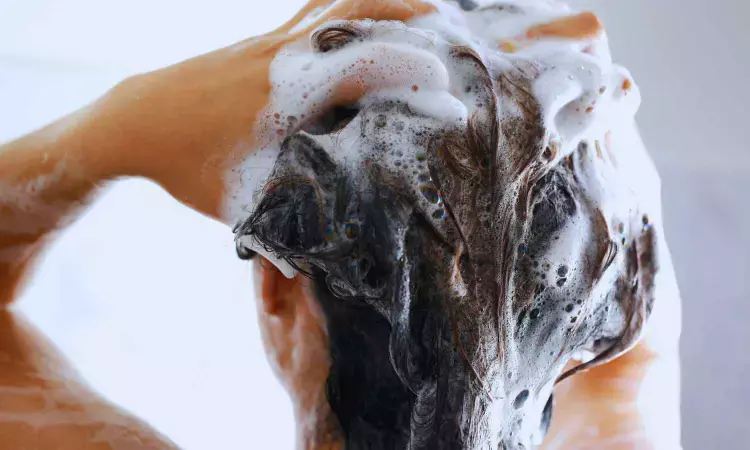- Home
- Medical news & Guidelines
- Anesthesiology
- Cardiology and CTVS
- Critical Care
- Dentistry
- Dermatology
- Diabetes and Endocrinology
- ENT
- Gastroenterology
- Medicine
- Nephrology
- Neurology
- Obstretics-Gynaecology
- Oncology
- Ophthalmology
- Orthopaedics
- Pediatrics-Neonatology
- Psychiatry
- Pulmonology
- Radiology
- Surgery
- Urology
- Laboratory Medicine
- Diet
- Nursing
- Paramedical
- Physiotherapy
- Health news
- Fact Check
- Bone Health Fact Check
- Brain Health Fact Check
- Cancer Related Fact Check
- Child Care Fact Check
- Dental and oral health fact check
- Diabetes and metabolic health fact check
- Diet and Nutrition Fact Check
- Eye and ENT Care Fact Check
- Fitness fact check
- Gut health fact check
- Heart health fact check
- Kidney health fact check
- Medical education fact check
- Men's health fact check
- Respiratory fact check
- Skin and hair care fact check
- Vaccine and Immunization fact check
- Women's health fact check
- AYUSH
- State News
- Andaman and Nicobar Islands
- Andhra Pradesh
- Arunachal Pradesh
- Assam
- Bihar
- Chandigarh
- Chattisgarh
- Dadra and Nagar Haveli
- Daman and Diu
- Delhi
- Goa
- Gujarat
- Haryana
- Himachal Pradesh
- Jammu & Kashmir
- Jharkhand
- Karnataka
- Kerala
- Ladakh
- Lakshadweep
- Madhya Pradesh
- Maharashtra
- Manipur
- Meghalaya
- Mizoram
- Nagaland
- Odisha
- Puducherry
- Punjab
- Rajasthan
- Sikkim
- Tamil Nadu
- Telangana
- Tripura
- Uttar Pradesh
- Uttrakhand
- West Bengal
- Medical Education
- Industry
Shampoo-Like Gel Could Help Chemo Patients Keep Their Hair, reports research

Cancer fighters know that losing their hair is often part of the battle, but Michigan State University researchers have developed a shampoo-like gel that has been tested in animal models and could protect hair from falling out during chemotherapy treatment.
Baldness from chemotherapy-induced alopecia causes personal, social and professional anxiety for everyone who experiences it. Currently, there are few solutions-the only ones that are approved are cold caps worn on the patient’s head, which are expensive and have their own extensive side effects.
Bryan Smith, an associate professor in the College of Engineering and with MSU’s Institute for Qualitative Health Science and Engineering, has developed a gel the consistency of shampoo that he hopes will help protect patients’ hair throughout treatment. When Smith was a trainee at Stanford University, he learned and used a process that inverted the typical engineering process, seeking to objectively identify and completely characterize critical clinical needs prior to solving them.
“This unmet need of chemotherapy-induced alopecia appealed to me because it is adjacent to the typical needs in medicine such as better treatments and earlier, more accurate diagnostics for cancer,” Smith said. “This is a need on the personal side of cancer care that, as an engineer, I didn’t fully recognize until I began interviewing cancer physicians and former cancer patients about it. Once I understood, it became clear to me that better solutions are very important to many cancer patients’ quality of life.”
This rigorous process of specifying the need, identifying possible solutions, developing an initial prototype, and refining and testing it led to the development of a gel described in a new paper appearing in Biomaterials Advances.
The gel is a hydrogel, which absorbs a lot of water and provides long-lasting delivery of drugs to the patient’s scalp. The hydrogel is designed to be applied to the patient’s scalp before the start of chemotherapy and left on their head as long as the chemotherapy drugs are in their system — or until they are ready to easily wash it off.
During chemotherapy treatment, chemotherapeutic drugs circulate throughout the body. When these drugs reach the blood vessels surrounding the hair follicles on the scalp, they kill or damage the follicles, which releases the hair from the shaft and causes it to fall out. The gel, containing the drugs lidocaine and adrenalone, prevents most of the chemotherapy drugs from reaching the hair follicle by restricting the blood flow to the scalp. Dramatic reduction in drugs reaching the follicle will help protect the hair and prevent it from falling out.
To support practical use of this “shampoo,” the gel is designed to be temperature responsive. For example, at body temperatures the gel is thicker and clings to the patient’s hair and scalp surface. When the gel is exposed to slightly cooler temperatures, the gel becomes thinner and more like a liquid that can be easily washed away.
Smith and his team hope to obtain federal and/or venture funding to move this research forward into clinical trials and, eventually, to human patients.
“The research has the potential to help many people,” Smith said. “All the individual components are well-established, safe materials, but we can’t move forward with follow-up studies and clinical trials on humans without the support of substantial funding.”
Reference:
Romila Manchanda, Alireza Aminoroaya, Brett Volmert, Jacob J. Haffner, Patrick Vaughan, Connor Grady, Tian Autumn Qiu, Bryan Ronain Smith, Hydrogel-based drug delivery system designed for chemotherapy-induced alopecia, Biomaterials Advances, https://doi.org/10.1016/j.bioadv.2025.214452.
Dr Kamal Kant Kohli-MBBS, DTCD- a chest specialist with more than 30 years of practice and a flair for writing clinical articles, Dr Kamal Kant Kohli joined Medical Dialogues as a Chief Editor of Medical News. Besides writing articles, as an editor, he proofreads and verifies all the medical content published on Medical Dialogues including those coming from journals, studies,medical conferences,guidelines etc. Email: drkohli@medicaldialogues.in. Contact no. 011-43720751


